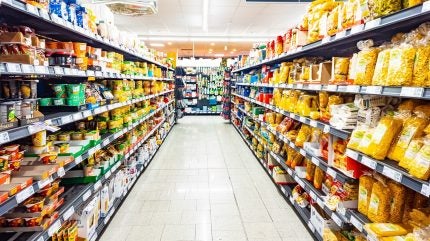
There should be “closer” scrutiny of M&A along Germany’s food supply chain, a government advisory body has said.
The Monopolies Commission handed its report on competition in the sector to the German government on Friday (21 November) after a study sparked by farmer protests in the country last year and recent food inflation.

Discover B2B Marketing That Performs
Combine business intelligence and editorial excellence to reach engaged professionals across 36 leading media platforms.
According to the report, market concentration in food retail and parts of the food industry has increased “significantly” in recent years.
The Commission has recommended “halting the ongoing concentration in the retail sector”, pointing to four grocers – Edeka, Rewe, Schwarz and Aldi – accounting for around 85% of Germany’s food retail market.
Retailers are increasingly expanding into manufacturing and negotiating directly with farmers, “strengthening” their bargaining position.
The report also said there is “an urgent need for action” when considering M&A among food manufacturers. “The ongoing concentration in food retailing must not continue at the manufacturer level,” Tomaso Duso, the Commission’s chairman, said.

US Tariffs are shifting - will you react or anticipate?
Don’t let policy changes catch you off guard. Stay proactive with real-time data and expert analysis.
By GlobalDataThe Bundeskartellamt, Germany’s competition watchdog, said it is “constantly looking at the competitive situation in food production and the food trade” and also “deals intensively with the vertical relationships between farmers, producers and retailers”.
The anti-trust body pointed to its decision to block Premium Food Group’s move to buy a clutch slaughterhouses in Germany from Dutch peer Vion.
It added: “The entire food supply chain will remain one of the most closely monitored economic sectors.”
The Commission said the profit margins of retailers and manufacturers have grown for over ten years alongside the concentration seen in the sector.
Consumer prices have increased “more sharply” than in many other EU countries, widening the gap between producer and consumer prices.
Duso said: “The high market concentration and rising food price mark-ups by manufacturers and retailers are worrying. Competition at these levels has weakened, while farmers, especially in the dairy and meat industries, have seen little long-term benefit.”
The report highlighted that existing laws against unfair trading practices are in place but farmers often avoid reporting violations due to a “so-called fear factor”.
Duso added: “We therefore need more consistent enforcement of existing rules.”
Further recommendations include scrutinising any possible joint dominance by the big four retailers in procurement markets and ending the habit of treating retailers’ buyer power as an automatic competitive counterweight.
The Commission also advocates evaluating past mergers. The authors of the report highlighted the 2016 ministerial approval of Edeka’s takeover of Kaiser’s Tengelmann and said there are “strong indications [the deal] has significantly damaged competition in the food retail sector”.
Duso said: “Ex-post evaluations based on good data can show how mergers actually affect competition.”




